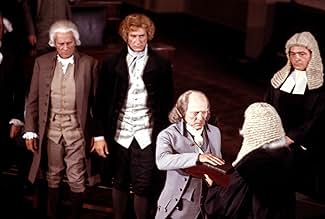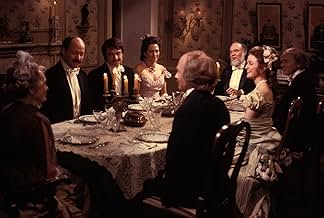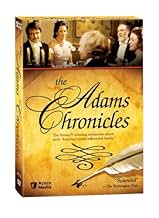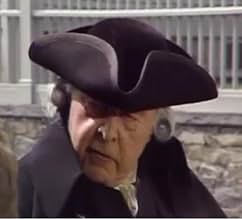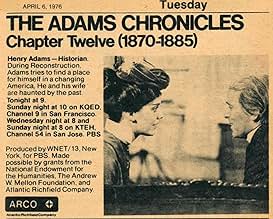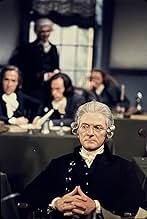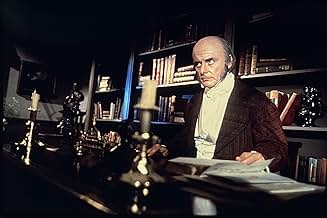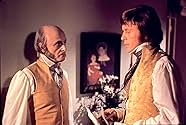Füge eine Handlung in deiner Sprache hinzuThis ambitious multi-part PBS production brings to life five generations of one of America's leading political and historical families, tracing their lives from John Adams' years as a coloni... Alles lesenThis ambitious multi-part PBS production brings to life five generations of one of America's leading political and historical families, tracing their lives from John Adams' years as a colonial Boston attorney to the rise in prominence of Brookes Adams in the fields of political a... Alles lesenThis ambitious multi-part PBS production brings to life five generations of one of America's leading political and historical families, tracing their lives from John Adams' years as a colonial Boston attorney to the rise in prominence of Brookes Adams in the fields of political and social philosophy. This mini looks into their triumphs and tragedies, exploring their g... Alles lesen
- 4 Primetime Emmys gewonnen
- 4 Gewinne & 17 Nominierungen insgesamt
Empfohlene Bewertungen
From a list of the episodes, one gets a sense of the scope of the Chronicles: (1) John Adams, Lawyer (1758-1770); (2) John Adams, Revolutionary (1770-1776); (3) John Adams, Diplomat (1776-1783); (4) John Adams, Minister to Great Britain (1784-1787); (5) John Adams, Vice President (1788-1797); (6) John Adams, President (1797-1801); (7) John Quincy Adams, Diplomat (1809-1815); (8) John Quincy Adams, Secretary of State (1817-1825); (9) John Quincy Adams, President (1825-1829); (10) John Quincy Adams, Congressman (1831-1848); (11) Charles Francis Adams, Minister to Great Britain (1861-1868); (12) Henry Adams, Historian (1870-1885); (13) Charles Francis Adams, II, Industrialist (1886- 1893).
The final three episodes focus on men with disparate concerns. These men went separate ways, and met separate frustrations. They did indeed experience what Nagel called a "descent from glory." As Charles Francis Adams, Sr., reflects after dreaming of his grandfather's role in the Revolutionary Era, "In those days, the fate of one man could be the fate of a country." Or, as Charles Francis Adams, II, remarks to Henry Adams, "Perhaps the models we placed ourselves against were larger than life." But perhaps the Adams family was merely living out what John Adams had predicted for nations: "There is no special providence for us. We are not the Chosen People that I know of. We must and shall go the way of the earth."
A few observations on the historical accuracy of the Chronicles are in order. First, they were prepared in cooperation with the Massachusetts Historical Society and the Adams Papers project. Unlike many similar docudramas, they are largely based on original documents--the massive collection of Adams family papers held by the MHS (copies of these filled over 600 reels of microfilm). For example, the criticisms John Adams directed to his fiancé Abigail Smith (not sitting erect, walking with her toes inward, etc.) come directly from a May 7, 1764, document that he bluntly entitled, "a Catalogue of your Faults, Imperfections, Defects, or whatever you please to call them."
Second, viewers should remember that, because they are largely based on the Adams family papers, the Chronicles tend to reflect the views of Adams family members. Thus, in the words of John Adams, Franklin may appear as a "lazy, senile old mischief maker," and Hamilton as an "intriguer." (Those interested in what the Founding Fathers thought about each other should read The Founders on the Founders (2008), edited by John Kaminski.)
Third, only some of the Adams family papers survive—many documents were deliberately destroyed. Work on the family papers began with John Adams, whose comment that they would "make you alternately laugh and cry, fret and fume, stamp and scold," suggests that he did not intend to destroy all the embarrassing records. But some subsequent family members clearly did intend to do so.
Growing up as an Adams was not easy. (John advised John Quincy, "if you do not rise to the head not only of your Profession, but of your Country, it will be owing to your own Laziness, Slovenliness and Obstinacy." When he was 5 or 6, John Quincy wrote to his cousin Elizabeth Cranch (who was a few years older than he), "i have made But veray little proviciancy in reading . . . to(o) much of my time in play (th)ere is a great Deal of room for me to grow better." And John Quincy, after trying to instruct his son Charles Francis, complained, "I find as with his elder brothers a difficulty in fixing his attention." Charles Francis was then two years old.) The Adams children were being trained to be intellectual and moral athletes. Some of those who survived this training did well. But not all survived. Some succumbed to alcoholism, or were fell short for other reasons. Many records relating to these unsuccessful family members have been destroyed. Few of the surviving records relate to John's son Thomas Boylston Adams or John Quincy's son George Washington Adams. Similarly, there remain very few documents about Henry Adams' wife "Clover" Hooper.
The Chronicles attempt to compensate, to some extent, for gaps in the documentary record. But they gloss over mental problems in "Clover's" family. Before "Clover" took her own life, her aunt and her sister had committed suicide, and her brother eventually died in a mental institution after an unsuccessful suicide attempt. Although it is not evident in the Chronicles, Henry's relatives had understandable misgivings about his marrying into the Hooper family.
Given their scope, the Chronicles had to omit and abbreviate much of the Adams story. Missing are John and Abigail's 1787 meeting with Sally Hemings, the reconciliation of Jefferson and Adams after Jefferson's presidency, Brooks Adams' historical writings, or anything about the fourth generation after 1893—Brooks Adams did not die until 1927.
This docudrama was highly successful. It received a total of 11 Emmy Awards, and 17 Emmy nominations (1976 and 1977), only three of which (to George Grizzard, Kathryn Walker, and Pamela Payton-Wright) were for acting. The appearance of certain characters is strikingly realistic (but most of them, from King George to John Calhoun, speak with the same accent). This miniseries provides an interesting glimpse into American history and the Adams family's place in it.
They followed the British miniseries format by using actors who had done stage work, lavish costumes, studio sets and exterior shots at locations that fit the scene.
The story revolves around John and Abigail Adams in the first five episodes; their son and his wife John Quincy and Louisa Catherine in four episodes; and grandson Charles Frances and both of his sons Henry and Brooke each have an episode.
John Adams was an important figure in the founding of our country, but he got lost in the shuffle because he was outshone by George Washington and Thomas Jefferson, and even his cousin Sam Adams. But his contributions may have even been greater because he got financial help from Holland during the latter part of the Revolution; helped Jefferson write the Declaration of Independence; through the groaning of Congress set up protocol such as how to address the President; and kept us out of war when everyone was screaming to get involved in the European mess in the final two years of the 18th century.
John's son and grandson also played important roles in helping this country to become the power that it became. But one has to remember there is always personal costs when you are in that position.
Fortunately Acorn Media has release the miniseries on DVD and it is a pleasure to see it again after so many years.
John Adams may have a lot to learn about good PR, but Abigail must have been one of the smartest and well-informed first ladies the US has ever had.
I wish I could buy the video series, but there appears to be none available. The film apparently is available in far-off university libraries throughout the country.
The cast is populated by several well known Broadway and television actors (including William Daniels who does a turn this time as John Quincy rather than the role he created in "1776"), and the majority of the performances are outstanding, particularly George Grizzard, Kathryn Walker, and Pamela Payton-Wright. If you every get a chance to see this mini...DO!
Wusstest du schon
- WissenswertesWilliam Daniels, who plays the elder John Quincy Adams on this series, first played the role of his father, John Adams, in the Broadway and movie versions of the musical "1776".
- VerbindungenFeatured in The 28th Annual Primetime Emmy Awards (1976)
Top-Auswahl
- How many seasons does The Adams Chronicles have?Powered by Alexa
Details
- Erscheinungsdatum
- Herkunftsland
- Sprache
- Auch bekannt als
- The Adams Chronicles
- Drehorte
- Produktionsfirmen
- Weitere beteiligte Unternehmen bei IMDbPro anzeigen


